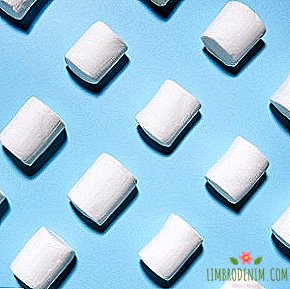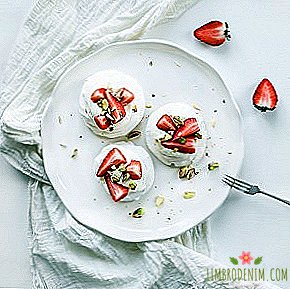"Ugly Delicious": How we began to eat consciously
CONSCIOUSNESS AND REFLECTION - it seems, under this slogan will be the beginning of the XXI century. This approach has spread to all areas of life, from shopping to creating a family. This movement could not affect the most basic side of life - food. We understand how we have become "there is more consciously" - and what results can be seen now.

Hunger and privileges
Most of the history of mankind, we just tried to survive - fighting for resources without spending too much effort on reflection. Despite the fact that there are still wars, homelessness and hunger in the world, many have much better living conditions than, say, a hundred years ago. It is the economic stability (precarious, but what is) and the wealth of resources that we can thank for reading books and thinking about the eternal. That we can allow ourselves to think about food as a cultural marker is a great privilege. Until now, hundreds of millions of people on Earth cannot afford this: according to statistics from the Food and Agriculture Organization of the United Nations in 2016, 815 million people throughout the world are still hungry.
However, the opportunity to consider food not as a basic necessity, but as entertainment or art should not be ashamed: the rule “put on an oxygen mask first on yourself and then on others” acts here without fail. It is easier for well-fed people to fight world hunger and also analyze the effect of food on culture - and vice versa. If you ate a very tasty dinner, which a professional prepared from quality products, the food probably gave you pleasant emotions. These experiences will go into action: they will help to spend the day productively or, say, reflect on the place of this dish in the context of the culinary heritage. Awareness is a right, not a whim, it allows you to create new useful things, and not just mumble while sitting on the couch.
Politics and reflection
There are two approaches to conscious consumption: active, yet it can be called political, and reflexive, or cultural. They are often shuffled, and you can hardly find them in their pure form, but there is a fundamental difference. Examples of active conscious consumption are veganism as a rejection of cruel capitalist practices, combating non-ecological techniques and gentrification, which depersonalizes the national cuisine, ideological and financial support of local industries and small farms. All these phenomena are united by the fact that their followers thought about food and how they consume it, saw their contribution to the problem phenomena and decided to put an end to it. We can argue for a long time about whether individual withdrawal from meat will reduce the greenhouse effect and whether it was impossible to support Russian farmers at the state level before the introduction of sanctions, but the fact remains: just food, such a simple piece of our everyday life can lead to a truly revolutionary movement and it is a conscious approach that allows every day, albeit little by little, to make people's lives more comfortable, full and happy.
A reflective approach can be considered the creation of a fundamentally new. The ideal example is the approach of Vladimir Mukhin, who cannot influence the country's gastronomy at the legislative level and instead methodically cultivates the garden, establishes work with those same farming and practically re-creates the “new Russian cuisine”. Mukhin is not the first to think about what it is, this Russian, and not Soviet food, but it was his work that turned out to be of a very high quality, and therefore noticeable. Following Mukhin, hundreds, even thousands of restaurants across the country, appeared, small food brands appeared, such as "Caribou" with its juniper-currant kombuchey or Siberrya, which produces chocolate with pine nuts gathered on the shores of Lake Baikal. In addition to respect for national food, we began to cultivate respect for a foreign culture - in Russia there is a real boom in ethnic food. Miracle, mango lassi and pho ka at least in Moscow can be bought at almost every step, while ten years ago behind this, most likely, you would have to go to the PFUR hostel.


"Ugly Delicious" and Anthony Bourdin
The way our attitude towards food has changed is most noticeable on the litmus test of modernity - television. If ten years ago our hearts and stomachs were mostly occupied by Smak with Makarevich, Nigel Lawson and methods of roasting chicken with mushrooms (by the way, it’s not a shame to master it yet), in the past couple of years the situation on the market of culinary shows has changed dramatically . Instead of algorithmic programs crammed into recipes, we now look at the adventures of the charismatic David Chang, who travels to the Chinese backwoods for an authentic recipe for dumplings and finds out how ethically it is to adapt such technologies - or follow the travels of the untimely deceased Anthony Burden, who told more or less about dishes, and about people, using food to build a story.
Apparently, such a breakthrough has so far occurred only on Western television (Netflix, as usual, ahead of the rest), but this only means that Russia needs a little time to think, sooner or later we will have a master chef who will travel to Suzdal and Vladivostok and study not the traditions of deep-fried roasting, like the show "Deep Fried Masters", but, for example, the traditions of roasting in the oven. It is because we generally don’t give a damn about where vegetables and meat come from on our table, the scriptwriters of gastronomic shows have lost the right to produce seasons dedicated to the thousand best chicken recipes. Instead, they show what role kitchen plays in our identity and how, with its help, we can not only get physical pleasure, but also experience important emotions: feel belonging to a social or ethnic group, experience pride, sadness or joy.
In "Chef's Table", which is worth seeing even to a person far from the gastronomic world, there are two excellent series that especially clearly show how each of us can choose an approach to the soul and how we can express feelings and ideas in food. In the first episode, Brazilian chef Alex Atal, who looks more like a rock band's bass guitar player, tells how he started working with a small farm on Amazon: he wanted to produce a tucupi with it, using cassava root, and at the same time help the local people. Everything was great, until Atala decided to send them humanitarian packages of food packed in plastic and metal, which the inhabitants of the village in Amazonia had no chance to process. All this garbage was accumulated and did not help the local people, but destroyed their land. Atala quickly realized his mistake and immediately stopped sending plastic to them, and since then has been actively advocating the preservation of Brazil's biodiversity and the support of local communities.
The second series is dedicated to Alexander Cuillon, who owns an island restaurant on the west coast of France, he got from his parents and did not bring much joy for a long time. Paradoxically, the success of the chief is directly related to the tragedy: in 1999, the Eureka oil tanker sank near Brittany, which spilled 30,000 tons of oil along the coast of France and killed up to half a million birds and an unknown amount of marine life. The crash hit the restaurant owner with a specialization just in fish and shellfish. But it was precisely due to reflection and lucky chance (namely, due to inaccurate instructions for the trainee) that Couillon came up with a dish that gave him inspiration, and for hundreds of its visitors it became a landmark. Now he serves the guests with an oyster, which they bathed in black oil salty broth with cuttlefish ink: the dish resembles how easily a person can destroy nature and how much effort is needed to reverse the consequences.
Not everyone has a restaurant on the coast of France or the opportunity to go on expeditions to learn more about the history of the favorite ingredient, but many can make small but significant decisions every day: will you eat lunch today from a chain restaurant or go to a small family cafe? Buy a bottle of water or fill a reusable bottle with filter water? Eat Snickers or Belevskaya marshmallow? Each such decision can be conscious and bring us joy, and this is the most important.
Photo: gorov - stock.adobe.com, Netflix





